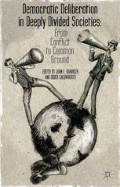Abstract
Is there any fundamental difference between ideal forms of deliberative democracy in deeply divided societies and those relatively stable societies where this idea first took root? Deliberative practices are supposed to invigorate contemporary political systems hindered by problems such as citizen apathy and legitimacy challenges. But the deliberative recipe is still in need of further specification in order to make it a feasible and tangible option in the case of stable democracies. And if we rather speak of a context of a profound societal division in terms of ideology, class, ethnicity, language or religion, then grounding efforts might seem even more daunting.
Access this chapter
Tax calculation will be finalised at checkout
Purchases are for personal use only
Preview
Unable to display preview. Download preview PDF.
References
Azmanova, A. (2010). ‘Deliberative Conflict and the “Better Argument” Mystique’. The Good Society, 19, 48–54.
Barnett, M.N. (2006). ‘Building a Republican Peace. Stabilizing States after War’. International Security, 30, 87–112.
Caluwaerts, D. and Deschouwer, K. (2013). ‘Building Bridges across Political Divides: Experiments on Deliberative Democracy in Deeply Divided Belgium’. European Political Science Review (published online).
Caluwaerts, D. and Reu champs, M. (Forthcoming). ‘Does Inter group Deliberation Foster Intergroup Appreciation? Evidence from Two Experiments in Belgium’, Politics (in press).
Drake, A. and McCulloch, A. (2011). ‘Deliberative Consociationalism in Deeply Divided Societies’, Contemporary Political Theory, 10, 372–92.
Dryzek, J. (2005). ‘Deliberative Democracy in Divided Societies: Alternatives to Agonism and Analgesia’, Political Theory, 33, 218–42.
Erman, E. (2009). ‘What Is Wrong with Agonistic Pluralism? Reflections on Conflict in Democratic Theory’, Philosophy ana Social Criticism, 35, 1039–62.
Fishkin, J.S. (2009). When the People Speak. Deliberative Democracy and Public Consultation. Oxford: Oxford University Press.
Fishkin, J.S. and Luskin, R.C. (2005). ‘Experimenting with a Democratic Ideal: Deliberative Polling and Public Opinion’. Acta Politica, 40, 284–98.
Gastil, J., Black, L. and Moscovitz, K. (2008). ‘Ideology, Attitude Change, and Deliberation in Small Face-to-Face Groups’, Political Communication, 25, 23–46.
Hamlett, P.W and Cobb, M.D. (2006). ‘Potential Solutions to Public Deliberation Problems: Structured Deliberations and Polarization Cascades’, Policy Studies Journal, 34, 629–48.
Hansen, K.M. (2007). ‘The Sophisticated Public: The Effect of Competing Frames on Public Opinion’, Scandinavian Political Studies, 30, 377–96.
Hibbing, J.R. and Theiss-Morse, E. (2002). Stealth Democracy: Americans’ Beliefs about How Government Should Work. Cambridge: Cambridge University Press.
McCarthy, S. (2011). ‘Soldiers, Chiefs and Church: Unstable Democracy in Fiji’. International Political Science Review, special issue, 32, 563–78.
Mendelberg, T. and Oleske, J. (2000). ‘Race and Public Deliberation’, Political Communication, 17, 169–91.
Mutz, D.C. (2006). Hearing the Other Side: Deliberative versus Participatory Democracy. New York, Cambridge University Press.
Nenkov, G.Y. and Gollwitzer, P.M. (2012). Pre-versus Post-Decisional Deliberation and Goal Commitment: The Positive Effects of Defensiveness’, Journal of Experimental Social Psychology, 48, 106–21.
O’Flynn, I. (2006). Deliberative Democracy and Divided Societies. Edinburgh: Edinburgh University Press.
O’Flynn, I.. (2010). ‘Deliberative Democracy, the Public Interest and the Consociational Model’, Political Studies, 58, 572–89.
Rosenberg, S. (2004). ‘Reconstructing the Concept of Democratic Deliberation’, paper presented at the Midwest Political Science Association annual meeting, Chicago, April 15.
Ryfe, D.M. (2005). ‘Does Deliberative Democracy Work?’ Annual Review of Political Science, 8, 49–71.
Schneiderhan, E. and Khan, S. (2008). ‘Reasons and Inclusion: The Foundation of Deliberation’, Sociological Theory, 26, 1–24.
Schwarzmantel, J. (2010). ‘Democracy and Violence: A Theoretical Overview’, Democratization, special issue, 17, 217–34.
Shapiro, I. 1999. ‘Enough of Deliberation: Politics Is about Interests and Power’, in S. Macedo (ed.), Deliberative Politics: Essays on Democracy and Difference. Oxford: Oxford University Press.
Steiner, J. (2012). The Foundations of Deliberative Democracy. Empirical Research and Normative Implications. Cambridge: Cambridge University Press.
Sunstein, C.R. (2003). ‘The Law of Group Polarization’, in James S. Fishkin and Laslett, P. (eds), Debating Deliberative Democracy. Oxford: Blackwell.
Wojcieszak, M. and Price, V. (2010). ‘Bridging the Divide or Intensifying the Conflict? How Disagreement Affects Strong Predilections about Sexual Minorities’, Political Psychology, 31, 315–39.
Copyright information
© 2014 Juan E. Ugarriza and Didier Caluwaerts
About this chapter
Cite this chapter
Ugarriza, J.E., Caluwaerts, D. (2014). Deliberation in Contexts of Conflict: An Introduction. In: Democratic Deliberation in Deeply Divided Societies. Palgrave Macmillan, London. https://doi.org/10.1057/9781137357816_1
Download citation
DOI: https://doi.org/10.1057/9781137357816_1
Publisher Name: Palgrave Macmillan, London
Print ISBN: 978-1-349-47088-4
Online ISBN: 978-1-137-35781-6
eBook Packages: Palgrave Political Science CollectionPolitical Science and International Studies (R0)

